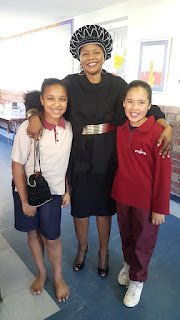In 2008 Gary Bunch wrote an article discussing the Patterns of Inclusive Education and how they are found when certain items come together in schools. These patterns do so at Pinelands North Primary School in South Africa.....
We have a questioning attitude...
Questioning is the key to all change and by looking at what we see and thinking about how it could be different, the school has changed what we do to become more inclusive. The questions do not have to be asked by management either: everybody in the school asks and re-asks which creates small steps towards a more inclusive reality. After asking the right questions, the people in the inclusive environment then need to have determination to follow through with ideas to better support the children.
Leadership is shown by everybody in the school and is encouraged at every level, regardless of the 'job status'. The expectation is that leaders watch for, and encourage, leadership in all others.
Leadership is shown by everybody in the school and is encouraged at every level, regardless of the 'job status'. The expectation is that leaders watch for, and encourage, leadership in all others.
Inclusion is respect for humanity and for social justice. You cannot believe in the rights of all if you do not run an inclusive community. Our school respects the right of all to learn, despite their differences or their learning needs. The desire to learn and all attempts at learning, are celebrated without arrogance or pity!
Achievement is celebrated too, not only by those teaching but by those learning too! It is not about achieving everything either...small bites of achievement, in everybody's own way, at their own time and in a way that makes sense to the individual, are all celebrated. The days of what the 'average child should have learnt' within a particular time frame, are over! Learning is not a competition or a race to the end! Every child's pace is different so the standard national curriculum should not be the standard for all children's learning. We see the curriculum as flexible; we adapt it for our children by adding to it, taking some subjects away, or taking parts of subjects from one year and adding them to another.
Every teacher at every school should know how to teach but when teachers arrive at our school, they need to grow in their own confidence that they too are able to teach every child, not just the 'usual average'. They need to learn that not completing the 'required assessments or curriculum' for some children is just fine! Our teachers have access to teacher aides and learning support helpers but they need to learn how to use them to support children better in their own classrooms. When teachers learn to accept help from others, they blossom! Collaboration is the key: all parts of the school add value for inclusion. The aftercare staff will check in on children they are worried about in the afternoons, the admin staff will notice a child alone at break times and the cleaning staff will notice a child who might not have lunch. We all believe we have our own role to play in this organism that supports inclusion.
No school can become inclusive unless there is great determination, particularly by the school management, to make change. Ideas need to be translated into action, even really small ones. Disregard the 'naysayers' as they will filter out of the system once they realise that the 'new way of learning' doesn't suit their way of teaching. The school then has the opportunity to replace those staff with ones who are more adaptable and flexible. This is a difficult step initially because parents can view 'good teachers leaving' negatively. Calmly allay their fears and continue.
Our school has been through those difficult beginnings and has come out the other side. Now we keep tweaking the systems by again asking questions, growing leaders and adjusting the curriculum every time a different child with different needs comes along. This has made us all more flexible and adaptable, so that we now know for sure that we can include almost any special need into our mainstream school!
Our school has been through those difficult beginnings and has come out the other side. Now we keep tweaking the systems by again asking questions, growing leaders and adjusting the curriculum every time a different child with different needs comes along. This has made us all more flexible and adaptable, so that we now know for sure that we can include almost any special need into our mainstream school!


No comments:
Post a Comment